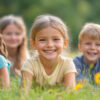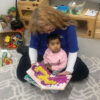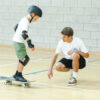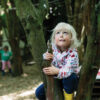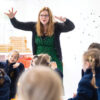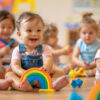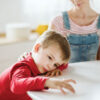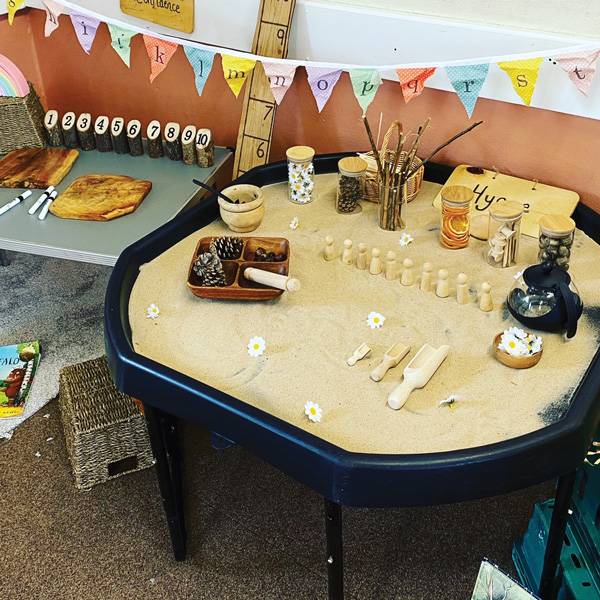
“Too often we give children answers to remember, instead of problems to solve.” Roger Lewin
Each term I do an audit of the resources we have on offer, I work out what the children have enjoyed and what seems to be great in theory but short lived in practice. I then spend some money on new and exciting resources. Today, I spent £17 in a St. Wilfred’s Hospice charity shop on resources that I’m not entirely sure what to do with myself – and that’s the point.
“Excuse me, what actually is this?” I asked the cashier brandishing a brass pot with a lid on it – “actually, ignore that – it doesn’t matter, it can be anything really.” I got a strange look when I explained I was buying resources for a preschool when in my basket I had a wooden serving dish, a toast rack, a straw hat, beads, bangles and scarves, a ceramic tea set from the 70’s and said brass pot.
I can’t predict where any of these items will lead the children in their play and that’s what excites me about it. I am tired of the same old Early Years, I am tired of previously much loved ‘Happyland’, I am tired of train tracks only ever being train tracks. I am tired of the same observations on the same children year after year and ticking a box to say they can do it. The new school year kickstarts the beginning of a brand new EYFS, an EYFS more children centred than ever before and it’s very exciting. I’ve always gone slightly outside of the expected parameters with my preschool, I’ve become accustomed to explaining my rationale for certain activities and I enjoy explaining them because I am unapologetically passionate about what I do and why I do it.
The children are predominantly outdoors and that comes with its own challenges as far as reassuring parents goes, but when I add that
I’m always on the hunt for donations of old china teapots and vintage phones and weighing scales I hear “but they’ll smash them” to which my response is always “they might do, but they will almost certainly learn something new from that experience.”
When we only allow children to play with plastic, brightly coloured and pre-planned toys, we stifle their imaginations and don’t allow any space for curiosity. We also don’t help them to learn how to handle heavier, more breakable items so inevitably when they are then given them they are inexperienced and any breakages become a negative experience. And we do nothing to foster a nurturing attitude towards the planet that we so badly need to start thinking more about. Plastic toys aren’t sustainable, they have a shelf-life and quite frankly, they’re a bit dull. That’s not to say we don’t currently have any plastic toys at the preschool but there will be a time in the not-so-distant future that we will banish them entirely.
Curiosity in children helps foster good relationships, good communication, satisfaction in play, stimulation and life-long learning. Children genuinely want to learn in the early years and it is so important that we get it right to allow that positive attitude to learning to continue throughout their school career.
A little while ago, I set up a ‘curiosity station’ instead of our usual ‘areas of development’ sections of the room. I had very few predictions about what it would achieve and it was mostly just an experiment. In part of my ‘curiosity station’ I had some metal garden spheres, initially these were just balls to throw and kick but when the children discovered their weight they became an object of schematic play, rolling them back and forth and between legs. It encouraged positive communication, new vocabulary and turn taking – all vital skills when starting school. I had a ‘tuff spot’ with sand, scoopers, jars of orange slices, conkers and pine cones, sticks, stones and bamboo cups – these became items from a restaurant where six children played together in harmony serving each other, taking orders and paying for their meals using the most expressive language and beautiful manners. It was also a dinosaur land where the children searched in debris for fossils and dinosaur bones. All of this learning was without any prompting from adults, it was in the moment, authentic, inspirational and fascinating. I was mentally noting endless observations about the children’s language, their social abilities and their natural interest in numbers and mathematical problems.
When we give children a train track and some trains and stop there, they stop there. There’s only so far they can go. A train can really only be a train but a brass pot can be anything they want it to be. When we give children a dolls house, they put the furniture in the rooms, put the people in the beds and then take it all out and start again – that’s exactly what we expect and part of the joy of working with small children is the unexpected. My favourite days are the days when the ‘plan’ doesn’t go to plan and the children become pirates following their own treasure maps because they didn’t want to make another junk modelling rocket ship, the days when they use the puddles to fill up cups and add petals and nettles to make potions and the days when I capture a little boy who previously ignored all books looking at a book because it is inside the climbing frame and not in the ‘book corner’.
The new EYFS is a new and desperately overdue opportunity for all settings, all practitioners, all teachers and anyone else working with children to continually ask themselves “why are we doing this? Who is it for?” We have been told we are to build our own curriculum. My curriculum is based on real experiences and that beautifully innocent desire to learn fostered through the medium of curiosity and I cannot wait to see where it all leads.
For more information please contact Sally-Ann at sallyann@pottershousepreschool.co.uk or call 07375 379148
www.pottershousepreschool.co.uk

